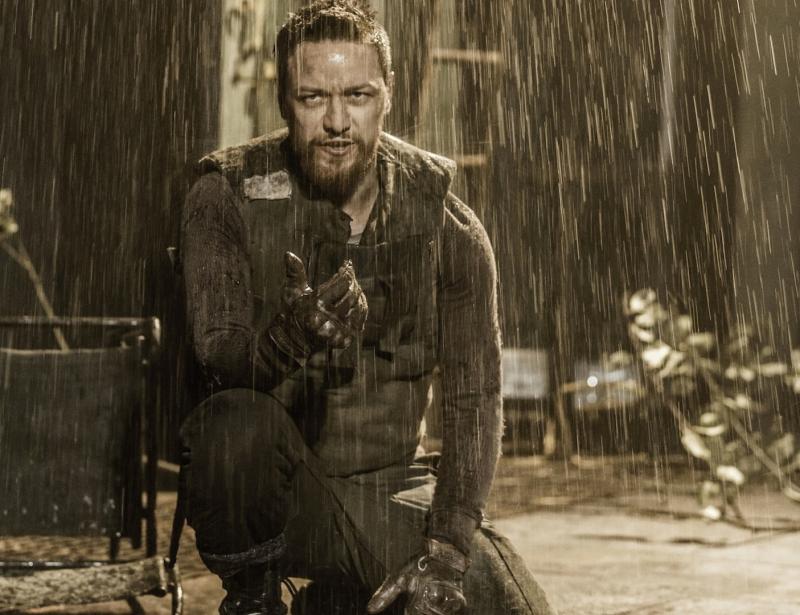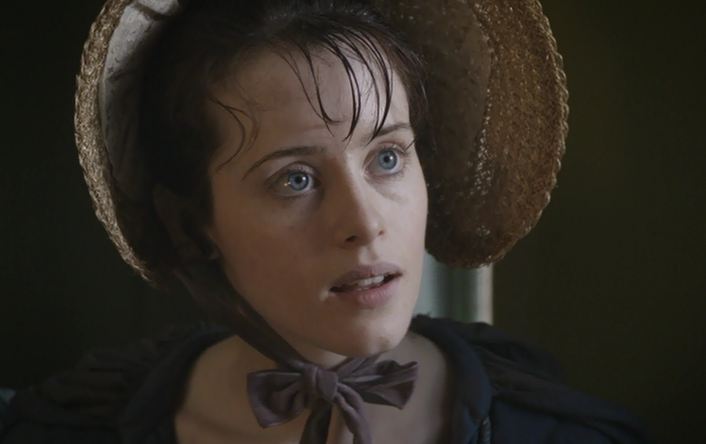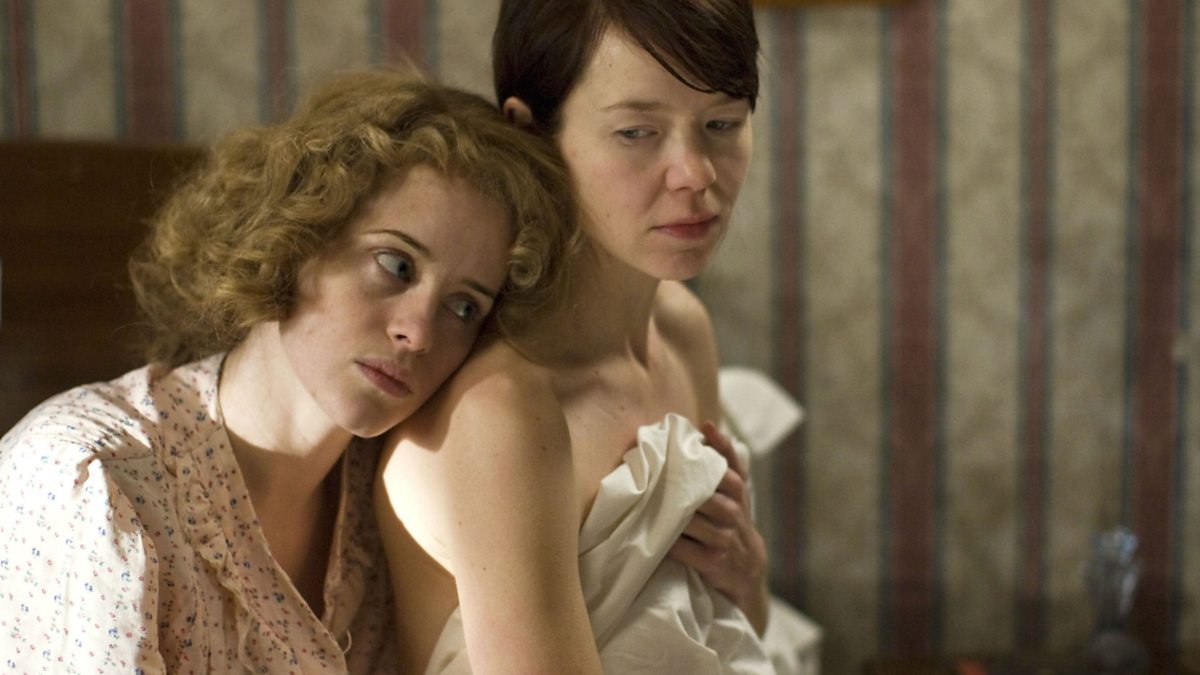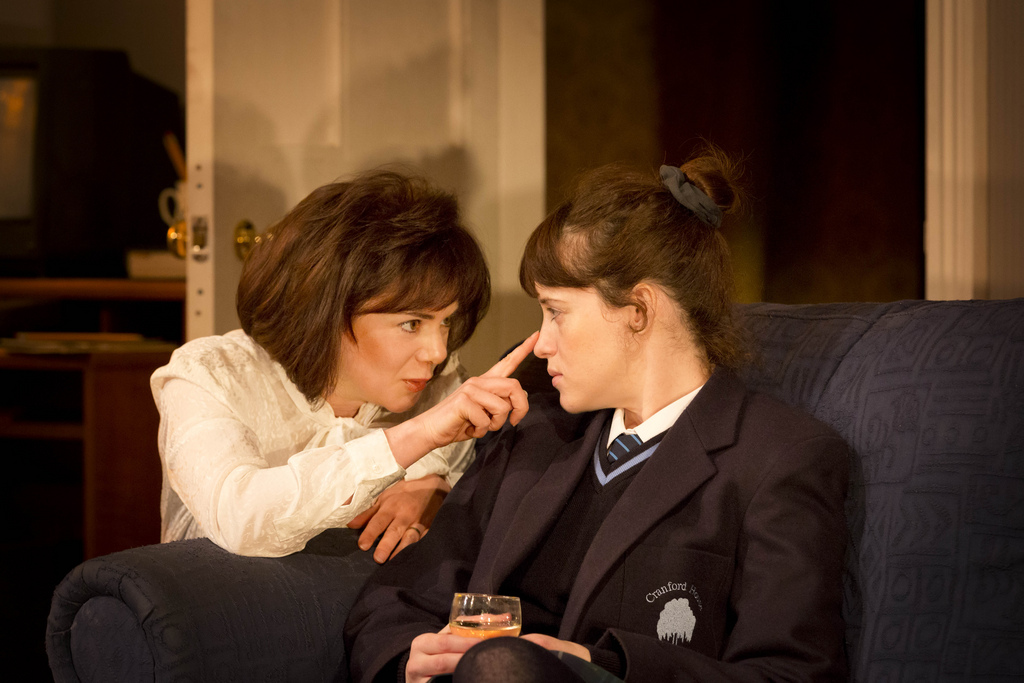Macbeth, Trafalgar Studios | reviews, news & interviews
Macbeth, Trafalgar Studios
Macbeth, Trafalgar Studios
James McAvoy is a revelation in Jamie Lloyd's thrilling production

The last time James McAvoy played the Scottish king, it was in a scintillating reworking of the play written in the modern idiom by Peter Moffat, for the BBC's ShakespeaRe-Told season in 2005. McAvoy was Joe Macbeth, a Glasgow chef passionate about his work, the restaurant kitchen where he worked a fitting place for the play's blood and gore.
Jamie Lloyd's production is equally thrilling and radical, and is set 50 years hence in a (possibly) post-independence Scotland, brutalised by war and, we may assume from the programme notes, ravaged by the effects of climate change. Soutra Gilmour's striking industrial design sets the dystopian scene – all harsh metals, broken windows and a drab colour palette for both set and the heavily soiled costumes, save for frequent splashes of claret; this is certainly the bloodiest Macbeth I've seen, and at one point it was raining blood.
The final confrontation between Macduff and Macbeth is a brilliant coup de théâtre
Macbeth is the first play in Trafalgar Transformed, a co-production between Lloyd and producer Howard Panter, a season in which they will stage classics and new works in the remodelled theatre. Its reconfigured stage means the audience is very close to the action and its raised height allows actors to enter the action from below, a direction used to great effect in a thrillingly energetic first act, with lots of entrances and exits through trapdoors. The energy is underlined by vibrant sound and lighting design by Alex Baranowski and Adam Silverman respectively.
 McAvoy appears, tooled up with axe and machete, as a muscular and brutal killing machine. He's very much a leader, charismatic and a man of action, but he conveys Macbeth's inner turmoil with great subtlety. There is an exquisite, heartstopping moment in Macduff's castle where, after he has sadistically watched his henchmen strangle Lady Macduff, Macbeth hesitates at the door after hearing her child's cry before going back to despatch him too. Was that a moment of conscience, or merely a calculation as to which weapon to use?
McAvoy appears, tooled up with axe and machete, as a muscular and brutal killing machine. He's very much a leader, charismatic and a man of action, but he conveys Macbeth's inner turmoil with great subtlety. There is an exquisite, heartstopping moment in Macduff's castle where, after he has sadistically watched his henchmen strangle Lady Macduff, Macbeth hesitates at the door after hearing her child's cry before going back to despatch him too. Was that a moment of conscience, or merely a calculation as to which weapon to use?
In a production full of ballsiness and with a closely argued themes, it's perhaps inevitable that some strands of the play might suffer, and for me it was in the relationship between the Thane and Lady Macbeth (Claire Foy, pictured above with McAvoy). Their marriage, with the suggestion of a lost child haunting them both and, like a weird form of replacement therapy, locking them into murderous ambition seems neither amorous nor complicit enough.
Things calm down noticeably after the interval, with much less of the crash, bang, wallop sound and lighting effects. Jamie Ballard's Macduff makes particular impact as the bereaved husband finding murderous intent of his own, even if Mark Quartley's Malcolm feels a little underpowered in their long exchanges. Both McAvoy and Foy convince in their “mad” scenes, while solid support comes from Hugh Ross as the Doctor and Allison McKenzie's Lady Macduff is spirited and touching. The final confrontation between Macduff and Macbeth in Birnam Wood is a brilliant coup de théâtre, again using the stage's reconfiguration to great effect.
McAvoy is a revelation, even if I wasn't entirely convinced by his rapid conversion from brave soldier to murderous tyrant. But this is an electric evening in the theatre, and augurs well for the rest of the Trafalgar Transformed season.
CLAIRE FOY’S CV
 Little Dorrit (2008). “Dickens did just see her as homely, angelic and giving. I looked on her as a sort of a carer whose parent or child is ill. That made her believable in my head.”
Little Dorrit (2008). “Dickens did just see her as homely, angelic and giving. I looked on her as a sort of a carer whose parent or child is ill. That made her believable in my head.”
Upstairs Downstairs (2010-12). Lady Persephone, posh little brown shirt based on the Hitler-obsessed Unity Mitford, tops herself in a dramatic exit from the second series.
The Night Watch (2011). Foy plays a troubled lesbian toy girl in an adaptation of Sarah Waters’ novel about heartache in the Blitz (pictured below with Anna Maxwell Martin)
 Wreckers (2011). Foy is wife to Benedict Cumberbatch in fraught low-budget Fenland drama
Wreckers (2011). Foy is wife to Benedict Cumberbatch in fraught low-budget Fenland drama
The Promise (2011). In Peter Kosminsky’s epic historical drama, Foy plays Erin Matthews, an 18-year-old obsessed with investigating the story of the British soldiers serving in Palestine in the years before our ignominious exit. “I just recognised quite a lot of things about me when I was her age.”
White Heat (2012). Foy is a feminist child of the Sixties who grows up to become Juliet Stevenson.
Hacks (2012). Guy Jenkin comedy inspired by the hacking scandal, in which Foy's feral tabloid editor Kate Loy is not remotely based on to Rebekah Brooks. A rare comic outing for an actress with natural funny bones.
 Love, Love, Love (2012). In Mike Barlett’s played Foy played a child of a hippie baby boomer. “It’s the Philip Larkin thing: she really does believe her parents did fuck her up. I hope I’m not like she is when she’s 37." (Pictured, Foy with Victoria Hamilton)
Love, Love, Love (2012). In Mike Barlett’s played Foy played a child of a hippie baby boomer. “It’s the Philip Larkin thing: she really does believe her parents did fuck her up. I hope I’m not like she is when she’s 37." (Pictured, Foy with Victoria Hamilton)
Macbeth (2013). “Why does everyone think she’s so evil? My approach to every character is you essentially want to understand. They always have something they are fighting against. They have lost a baby and that’s the catalyst for everything.”
Wolf Hall (2015). Foy’s Anne Boleyn goes toe to toe with Mark Rylance and Damian Lewis.
The Crown (2016). Queen of all she surveys. Bring on series two.
rating
Explore topics
Share this article
The future of Arts Journalism
You can stop theartsdesk.com closing!
We urgently need financing to survive. Our fundraising drive has thus far raised £49,000 but we need to reach £100,000 or we will be forced to close. Please contribute here: https://gofund.me/c3f6033d
And if you can forward this information to anyone who might assist, we’d be grateful.

Subscribe to theartsdesk.com
Thank you for continuing to read our work on theartsdesk.com. For unlimited access to every article in its entirety, including our archive of more than 15,000 pieces, we're asking for £5 per month or £40 per year. We feel it's a very good deal, and hope you do too.
To take a subscription now simply click here.
And if you're looking for that extra gift for a friend or family member, why not treat them to a theartsdesk.com gift subscription?
more Theatre
 Hedda, Orange Tree Theatre review - a monument reimagined, perhaps even improved
Scandinavian masterpiece transplanted into a London reeling from the ravages of war
Hedda, Orange Tree Theatre review - a monument reimagined, perhaps even improved
Scandinavian masterpiece transplanted into a London reeling from the ravages of war
 The Assembled Parties, Hampstead review - a rarity, a well-made play delivered straight
Witty but poignant tribute to the strength of family ties as all around disintegrates
The Assembled Parties, Hampstead review - a rarity, a well-made play delivered straight
Witty but poignant tribute to the strength of family ties as all around disintegrates
 Mary Page Marlowe, Old Vic review - a starry portrait of a splintered life
Tracy Letts's Off Broadway play makes a shimmeringly powerful London debut
Mary Page Marlowe, Old Vic review - a starry portrait of a splintered life
Tracy Letts's Off Broadway play makes a shimmeringly powerful London debut
 Little Brother, Soho Theatre review - light, bright but emotionally true
This Verity Bargate Award-winning dramedy is entertaining as well as thought provoking
Little Brother, Soho Theatre review - light, bright but emotionally true
This Verity Bargate Award-winning dramedy is entertaining as well as thought provoking
 The Unbelievers, Royal Court Theatre - grimly compelling, powerfully performed
Nick Payne's new play is amongst his best
The Unbelievers, Royal Court Theatre - grimly compelling, powerfully performed
Nick Payne's new play is amongst his best
 The Maids, Donmar Warehouse review - vibrant cast lost in a spectacular-looking fever dream
Kip Williams revises Genet, with little gained in the update except eye-popping visuals
The Maids, Donmar Warehouse review - vibrant cast lost in a spectacular-looking fever dream
Kip Williams revises Genet, with little gained in the update except eye-popping visuals
 Ragdoll, Jermyn Street Theatre review - compelling and emotionally truthful
Katherine Moar returns with a Patty Hearst-inspired follow up to her debut hit 'Farm Hall'
Ragdoll, Jermyn Street Theatre review - compelling and emotionally truthful
Katherine Moar returns with a Patty Hearst-inspired follow up to her debut hit 'Farm Hall'
 Troilus and Cressida, Globe Theatre review - a 'problem play' with added problems
Raucous and carnivalesque, but also ugly and incomprehensible
Troilus and Cressida, Globe Theatre review - a 'problem play' with added problems
Raucous and carnivalesque, but also ugly and incomprehensible
 Clarkston, Trafalgar Theatre review - two lads on a road to nowhere
Netflix star, Joe Locke, is the selling point of a production that needs one
Clarkston, Trafalgar Theatre review - two lads on a road to nowhere
Netflix star, Joe Locke, is the selling point of a production that needs one
 Ghost Stories, Peacock Theatre review - spirited staging but short on scares
Impressive spectacle saves an ageing show in an unsuitable venue
Ghost Stories, Peacock Theatre review - spirited staging but short on scares
Impressive spectacle saves an ageing show in an unsuitable venue
 Hamlet, National Theatre review - turning tragedy to comedy is no joke
Hiran Abeyeskera’s childlike prince falls flat in a mixed production
Hamlet, National Theatre review - turning tragedy to comedy is no joke
Hiran Abeyeskera’s childlike prince falls flat in a mixed production
 Rohtko, Barbican review - postmodern meditation on fake and authentic art is less than the sum of its parts
Łukasz Twarkowski's production dazzles without illuminating
Rohtko, Barbican review - postmodern meditation on fake and authentic art is less than the sum of its parts
Łukasz Twarkowski's production dazzles without illuminating

Add comment